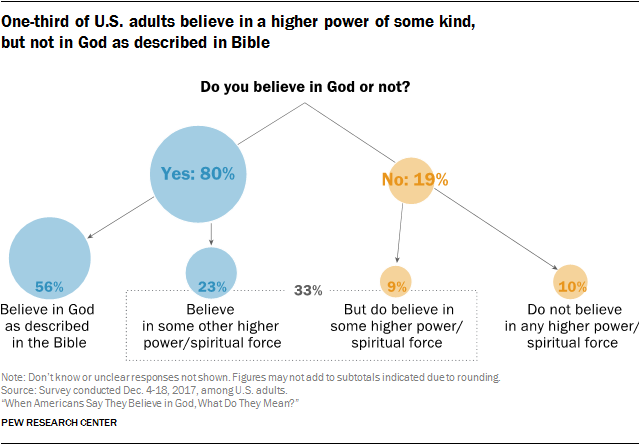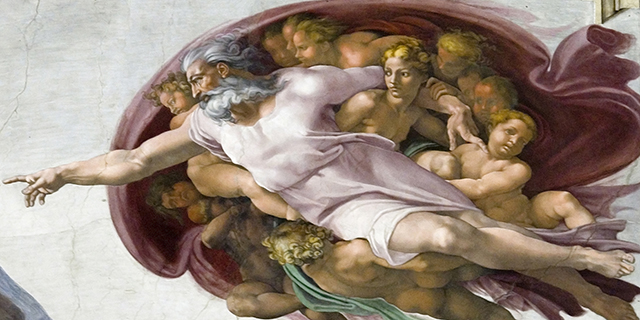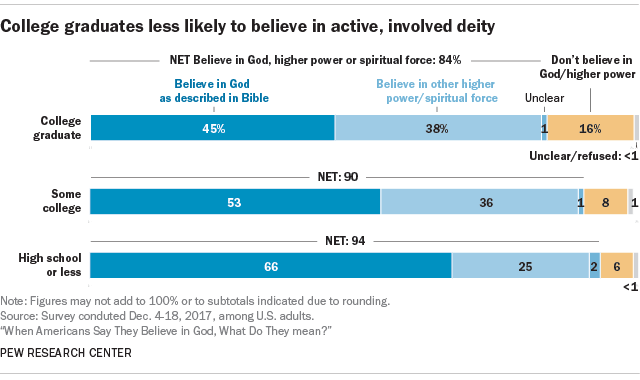In recent years, the share of American adults who do not affiliate with a religious group has risen dramatically. In spite of this trend, the overwhelming majority of Americans, including a majority of the religiously unaffiliated – those who describe themselves, religiously, as atheists, agnostics or “nothing in particular” – say they believe in God or a higher power, according to a new Pew Research Center survey conducted in December of 2017. At the same time, only a slim majority of Americans now believe in the God of the Bible and roughly one-in-ten U.S. adults don’t believe in any higher power or spiritual force.
Here are six key takeaways from the report:
The vast majority of Americans (90%) believe in some kind of higher power, with 56% professing faith in God as described in the Bible and another 33% saying they believe in another type of higher power or spiritual force. Only one-in-ten Americans say they don’t believe in God or a higher power of any kind.

In the U.S., Christians are particularly likely (99%) to believe in God or a higher power, with 80% claiming faith in a biblical God. Three-quarters of Christians describe God as all-loving, all-knowing and all-powerful. Like Christians, most Jews (89%) have faith in a deity. But just a third of Jews (33%) say they believe in God as described in the Bible, while 56% say they believe in some other higher power. Jews are also more likely than Christians to say they don’t believe in a spiritual force of any kind (10% vs. 1%). Finally, among those who describe themselves as religiously unaffiliated – also known as “nones” – 72% say they believe in a higher power of some kind.

About half (48%) of U.S. adults believe God determines what happens to them most or all of the time. Nearly eight-in-ten U.S. adults think God or a higher power has protected them, and two-thirds of Americans say they have been rewarded by the Almighty. At the same time, fewer see God as judgmental and punitive, with just four-in-ten saying they have been punished by the deity in which they believe.
Younger adults (those under the age of 50) are less inclined than older Americans to believe in a biblical God and more likely to say they don’t believe in any higher power or spiritual force. While roughly two-thirds of older adults say they believe in the biblical God, just 49% of those in their 30s and 40s – and just 43% of adults under 30 – say the same. Even with this age gap, an overwhelming majority of the youngest adults continue to believe in God or a higher power: Eight-in-ten of those ages 18 to 29 say they believe in at least some kind of spiritual force.
Americans with a high school education or less are more likely than college graduates to believe in God or a higher power (94% vs. 84%). They also are more likely than those who graduated from college to believe in the God of the Bible (66% vs. 45%) and to believe that a higher power determines what happens in their lives most or all of the time (59% vs. 33%).
Republicans and Democrats have very different beliefs about God. Democrats and those who lean toward the Democratic Party are less likely to say they believe in the God of the Bible than Republicans and Republican leaners (45% vs. 70%). Democrats are more likely than Republicans (39% vs. 23%) to say they believe in a higher power other than the biblical God. They also are more likely to say they don’t believe in any deity at all (14% vs. 5%). The survey also finds big racial differences among Democrats; most nonwhite Democrats – who are predominantly black or Hispanic – believe in God as described in the Bible (61%), compared to just 32% of white Democrats.





